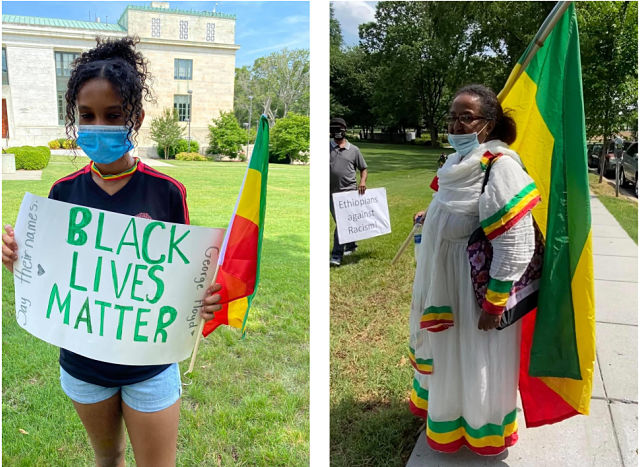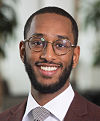 Eskender A. Yousuf, a second-generation Ethiopian American, is a Ph.D. student at the University of Minnesota studying education policy and leadership. In the following article published on MinnPost he calls out the lack of insufficient solidarity in our community with African Americans amid the ongoing Black Lives Matter movement in the United States. (Photo by Matt Andrea/Tadias archive)
Eskender A. Yousuf, a second-generation Ethiopian American, is a Ph.D. student at the University of Minnesota studying education policy and leadership. In the following article published on MinnPost he calls out the lack of insufficient solidarity in our community with African Americans amid the ongoing Black Lives Matter movement in the United States. (Photo by Matt Andrea/Tadias archive)
MinnPost
By Eskender A. Yousuf

“I was on a recent conference call helping an organization put a statement together and this Sudanese brother says, ‘I don’t understand this Black Lives Matter stuff, I have never felt racism in this country.’ You know, I’m just letting people have it now … we [African-Americans] can sniff out anti-Blackness right when we step in the room, wherever we are. … I have never felt welcomed or comfortable in any African immigrant establishment in Minnesota.” These words come from a recent conversation I had with a close connection of mine.
This was nothing short of our regular conversations and check-ins; however, this time it felt different. With the wake of the current racial uprisings, it provoked me to publicly call attention this issue.
As a second-generation Ethiopian immigrant who is ethnically Oromo, I was born and raised in the Twin Cities. I never imagined that the place I call home would become the epicenter of historic racial uprisings and protests that sparked a fire across the world.
Amongst the sea of protesters that stood in solidarity in the streets of Minneapolis in the wake of George Floyd’s death were 1.5 and second-generation African immigrants (1.5 generation immigrants refer to those who came to America before they reached 12 years old; second-generation immigrants refer to those who were born in America).
Minneapolis, in fact, is home to a diverse population of racially Black individuals and a large fraction of them are African immigrants and refugees. We have the largest population of Somali immigrants, a vast number of Ethiopians, as well as immigrants from other African countries like Eritrea, Sudan, Liberia, and Nigeria. While African immigrant communities showed up in large numbers to protest police brutality and racial injustices, an oft-neglected nuance is the prevalence of anti-Blackness within these very communities.
The support for the Black Lives Matter movement from the African immigrant community demands that we address and correct the racist practices within our own community that are often left unquestioned. For us to truly support the call for racial injustice, we must take the step eradicate anti-Blackness within our own communities.
Growing up in the Twin Cities, I have witnessed countless anti-Black sentiments, expressions, attitudes, and practices from close relatives and community members. Some examples include: looking down on marrying African-Americans, addressing and treating African-Americans and their communities by negative racialized stereotypes (i.e. lazy, not hardworking, criminals) and our perpetual disassociation with the African-American community in order to distinctly identify ourselves as African immigrants and not “Black/African-American.” This identification process has been heavily documented and proved as a mechanism for us to distance ourselves from African-American communities for various reasons, including social stratification.
Racist undertones within languages
Furthermore, there are racist undertones within our languages and cultural practices that are anti-Black at their core. The way in which we use our own languages to describe African-Americans carry negative connotations. For example, terms like “madow” (Somali) or “gurraacha” (Oromo) literally mean black, but convey a deeper disdain. The way and which we utilize these terms to identify African-Americans is a way of positioning them as inferior to our own African immigrant identities, as noted by immigrant scholars like Nimo Abdi.
I bring forth these examples in order to shed light on the anti-Black and racist injustices that we allow to thrive in our community. As we stand in solidarity against racist practices, it is equally important that we call out and rectify the injustice within our own communities. If we refuse to acknowledge these issues, it is nothing short of hypocrisy.
—
Related:
Ethiopian-Eritrean Trhas Tafere Reflects on Africans’ Perspective on Race in America
The Other Face of Privilege: An Ethiopian American Perspective by Amen Gashaw
Photos: Ethiopians Show Solidarity with Black Lives Matter in D.C.
An Open Letter to PM Abiy Ahmed Ali: By Lydia A. Gorfu
Watch: Mahdere Yared on The Long-Term Effects of Racism (TEDx Pine Crest School class of 2021)
Join the conversation on Twitter and Facebook.

























